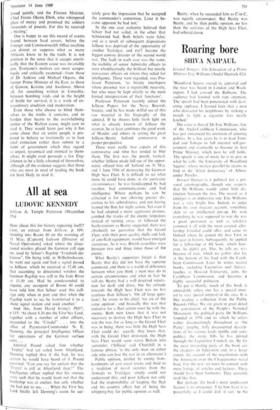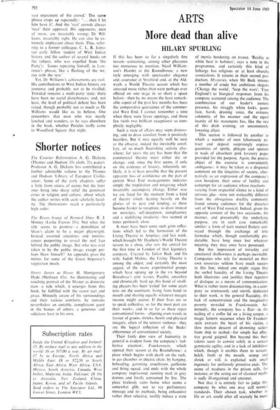Inward Hunger: The Education of a Prime Minister Eric Williams
(Andre Deutsch 42s).
Roaring bore
SHIVA NAIPAUL
`Woodford Square roared its approval and the roar was heard in London and Wash- ington. I had crossed the Rubicon. The audience had listened with rapt attention. The speech had been punctuated with deaf- ening applause. I learned later that a man who distracted his neighbours by striking a match to light a cigarette was nearly lynched.'
The voice is that of Dr Eric Williams, late of the Anglo-Caribbean Commission, who has just announced his intention of entering politics. In a few years he is to lead Trini- dad and Tobago to full internal self-gov- ernment and eventually to become its first Prime Minister, which post he still holds. The speech is one of many he is to give in what he calls 'the University of Woodford Square'. whose nearest parallel he claims to find in the 'direct democracy' of Athens under Pericles.
Inward Hunger is a political not a per- sonal autobiography, though one suspects that Dr Williams would admit little dis- tinction between the two. The record as it emerges is an impressive one. Eric Williams was a eery bright boy. Indeed, to judge from his own staccato account, something akin to an intellectual pin-up. He won everything he was supposed to win (he was a good sportsman as well as scholar), crowned it all with the most coveted scho- larship Trinidad could offer, and came to Oxford where he gained the best First in his year in history. Subsequently, he applied for a fellowship at All Souls, which how- ever, he didn't get. This, he tells us. was because of race, which we gather also lay at the bottom of his feud with the Carib- bean Commission. Later he writes several books, including Capitalism and Slavery. teaches at Howard University, joins the Caribbean Commission, and becomes a highly successful politician.
To put it bluntly, much of this book is unreadable unless one has a special inter- est (a very special interest) in the area. It is like reading a collection from the Public Records Office. We arc given in great detail the constitution of the People's National Movement, the political party Dr Williams founded in 1956 and to which he refers rather disconcertingly throughout as 'the Party': lengthy. fully documented descrip- tions of his carious feuds (public and semi- public); the many bills he has piloted through the Legislative Council. etc. By far the most interesting parts of the book are the chapters on federation and, to a lesser extent. the account of the negotiations with the Americans over the Chaguaramas naval base. For the rest, we must be content with mere listings of articles and lectures. These should have been footnotes. They certainly read like that.
But perhaps the book's most unpleasant feature is its arrogance. 'I let him have it as powerfully as I could dish it out, to the vast enjoyment of the crowd.' The same phrase crops up repeatedly: ' ... then I let him have it'. And the 'vast' crowds always `roar' their approval. His opponents, men of straw, are invariably wrong; Dr Wil- liams, invariably right. He can also be ex- tremely unpleasant about them. Thus, refer- ring to a former colleague, C. L. R. James (an early fellow student of West Indian history and the author of several books on the subject, who was expelled from 'the Party'): 'James repeating himself, in Law- rence's phrase, like a flushing of the wc, ran with the rest.'
Yet, Dr Williams's achievements are real. His contributions to West Indian history are immense and probably not to be rivalled; Trinidad remains a multi-party state; there have been no racial disturbances; and, not least, the level of political debate has been raised, though probably not as much as Dr Williams would like us to believe. One remembers that man who was nearly lynched and wonders, as he says elsewhere in the book, whether Pericles really came to Woodford Square that night.



































 Previous page
Previous page